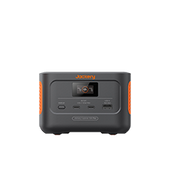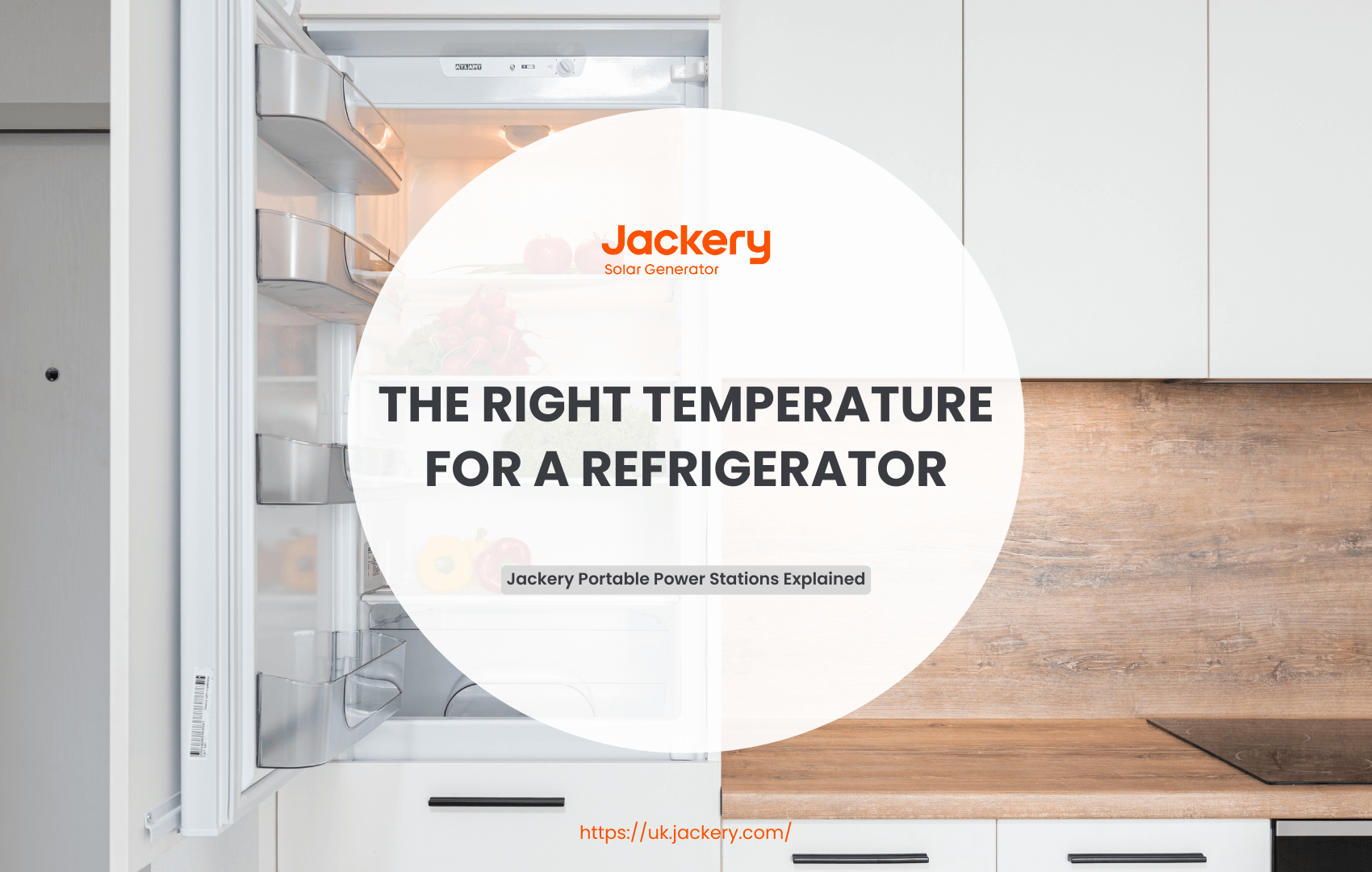A camping refrigerator is a compact refrigeration device ideal for road trips, camping adventures, boat trips, and emergencies. It keeps perishable food and drinks constantly cold, eliminating the need to frequently purchase ice or deal with the limitations of traditional coolers. During regular operation, a camping refrigerator consumes between 50 and 100 watts, which is average for outdoor equipment.
Power sources include the campsite's primary power source, a vehicle's battery system, and a portable power station. Portable power stations, such as the Jackery Explorer 1000 v2 and 2000 v2, provide stable, efficient, and safe power for camping refrigerators.
|
Key Takeaways: |
|
Why Do I Need a Camping Refrigerator?
A camping refrigerator makes an excellent addition to any outdoor excursion. It is not only portable, but it also keeps food fresh, allowing those in the great outdoors to refuel while on the go. Below, I'll explain why a camping refrigerator is essential:
Food Preservation: A camping refrigerator enables you to keep food refrigerated at the ideal temperature, preserving its quality and freshness. This keeps food fresher for longer, allowing you to transport a broader range of perishables, such as vegetables, dairy goods, and meat.
No Need to Buy Ice: A camping refrigerator makes it easy to access cool drinks, snacks, and supplies without having to resupply continuously. Melted ice buckets can easily ruin food. Camping refrigerators, on the other hand, keep food dry and clean.
Versatile Uses: Camping refrigerators are designed to be adaptable and suitable for use in a wide range of settings. They can be powered by AC, DC, or even batteries, making them ideal for use in vehicles, RVs, boats, or off-grid areas where standard refrigerators are not available.
What Are the Different Types of Camping Refrigerators?
There are three primary types of camping refrigerators available on the market. While they may appear identical, their functioning principles, features, benefits, drawbacks, and intended uses differ greatly. Here's an overview of each type:

Compressor Refrigerator
Compressor refrigerators are ideal for camping since they offer a reliable and efficient cooling system. They operate similarly to ordinary domestic refrigerators, featuring a compressor and refrigerant that pump cool air throughout the interior.
Their powerful chilling capacity maintains low temperatures even in hot conditions, allowing food and drinks to be chilled or frozen for extended periods. Compressor refrigerators are pricey, but they deliver dependable performance and adaptability.
Absorption Refrigerator
Absorption refrigerators are a common and standard piece of equipment in RVs. These refrigerators use a heat source, such as a propane flame or solar energy, to power a dual refrigerant cycle, which involves no mechanical motion. This provides efficient cooling, particularly when combined with strong insulation to avoid excessive heat leakage. While they are slower to cool, their quiet operation and versatility with a range of heat sources make them excellent for areas with little electricity.
Thermoelectric Refrigerator
Thermoelectric refrigerators have limited cooling capability and are often unsuitable for freezing items; hence, they are best used for short excursions. They use the Peltier effect to work; therefore, no compressor or refrigerant is required.
When direct current flows around a loop made up of two different conductors, heat is absorbed (cooled) at one end and dissipated at the other. While thermoelectric refrigerators are lightweight, energy-efficient, and generally less expensive than compressor refrigerators, they can struggle to maintain low temperatures in warmer climes, necessitating the use of a fan to direct heat away from the release end.
|
Features |
Compressor Refrigerator |
Absorption Refrigerator |
Thermoelectric Refrigerator |
|
Cooling Capacity |
Very Strong |
Medium |
Weak |
|
Cooling Efficiency |
High |
Medium |
Low |
|
Energy Source |
12V/24V DC, 220V AC |
Propane Gas, 220V AC, 12V DC |
12V/24V DC, 220V AC |
|
Energy Consumption |
Low |
Depends on Energy Source |
High |
|
Ambient Temperature Impact |
Small |
Slight Impact |
Extremely Loud |
|
Noise Level |
Slightly Noisy |
Completely Silent |
Quiet |
|
Weight |
Heavier |
Heavier |
Lightweight |
|
Price |
High |
Medium |
Affordable |
What Size Camping Refrigerator Do I Need?
Choosing the proper size camping refrigerator allows you to find the ideal balance between storage capacity and portability. Picking a lower size is insufficient, yet picking a larger size takes up more space and requires more electricity. Choosing the correct size camping refrigerator might be difficult. We'll walk you through the process of selecting the appropriate size for your camping refrigerator.
Understanding Common Capacities of Camping Refrigerators
When comparing different camping refrigerator models, you'll notice that capacity is measured in litres. This can be difficult to understand intuitively, so we're using the number of beverage cans as a guide for camping refrigerator capacity:
|
Camping Refrigerator Capacity |
Number of Beverage Cans |
Details |
|
25L |
27 cans |
Refrigerate small amounts of food and drinks |
|
35L |
47 cans |
Suitable for a weekend trip for two people or a week of camping for one person |
|
40L |
60 cans |
Suitable for a weekend trip for two or three people |
|
50L |
72 cans |
Perfect for a week-long adventure for two or a long weekend for a family of four |
|
60-65L |
106 cans |
Family camping trips longer than a long weekend |
|
80L |
120 cans |
Perfect for weekend outdoor gatherings of more than ten |
Source: Mygenerator
Choosing the Right Size Camping Refrigerator for Different Needs
There's no single right-sized camping refrigerator; it depends primarily on the number of people, the duration of your trip, your eating habits, and your travel style.
Number of People
The larger the group, the larger the capacity of the camping refrigerator you'll need. Generally speaking:
For 1-2 people: 20-40 litres is usually sufficient.
For 3-4 people: 40-60 litres is a comfortable option.
For groups of four or more people, a camping refrigerator with a capacity of 60 litres or larger is recommended.
Distance of Trip
Long trips often require a larger camping refrigerator to store enough food and drinks. Weekend trips (2-3 days): A 20-40 litre camping refrigerator is sufficient.
Weeklong trips: A larger refrigerator (40-60 litres) may be necessary, and restocking will be required more frequently.
Travel Method
Your travel method, specifically whether you're driving, also determines the size of your camping refrigerator. Almost all vehicles can accommodate a 40-50 litre refrigerator. Large SUVs or pickup trucks can accommodate a 60-litre or larger refrigerator. However, if you're backpacking, even on longer trips, it's best to choose a smaller camping refrigerator and restock it frequently.
If you're unsure, a refrigerator in the 40-50 litre range is always a good choice and will meet most common needs. However, the litres listed by the manufacturer are usually the total capacity, which includes space occupied by dividers, the compressor bump, and other components. The practically usable capacity is often 10%-15% less than the stated capacity.

Does a Camping Refrigerator Consume a Lot of Electricity?
Compared to full-size refrigerators, which consume between 100 and 800 watts of electricity, camping refrigerators are relatively energy-efficient and use a significantly smaller amount of power.
On average, a camping refrigerator consumes between 50 and 100 watts during regular operation and 200 to 400 watts when started. However, specific power consumption varies depending on the model, size, and efficiency of the appliance. For example, camping refrigerators equipped with energy-saving modes consume even less.
To calculate a camping refrigerator's daily power consumption, multiply its rated power by its actual operating hours to get a rough estimate.
Daily Power Consumption (kWh) = Rated Power (kW) × Daily Operating Hours (Hours)
For example, if a 50W camping refrigerator runs for 8 hours per day, its power consumption is approximately 0.4 kWh (Daily Power Consumption (kWh) = 0.05 kW × 8 hours = 0.4 kWh).
The power rating on a camping refrigerator's label refers to the compressor's power consumption when it's operating, but it doesn't run continuously. Therefore, you shouldn't use the power multiplier (power/24 hours) formula, as it would result in a significant overestimation. Typically, a refrigerator runs approximately 8 hours out of every 24 hours.
|
Camping Refrigerator Wattage |
Estimated kWh Used Per Day |
Estimated kWh Used Per Month |
Estimated kWh Used Per Year |
|
50W |
0.4 kWh/day |
12 kWh/month |
146 kWh/year |
|
60W |
0.48 kWh/day |
14.4 kWh/month |
175.2 kWh/year |
|
70W |
0.56 kWh/day |
16.8 kWh/month |
204.4 kWh/year |
|
80W |
0.64 kWh/day |
19.2 kWh/month |
233.6 kWh/year |
|
90W |
0.72 kWh/day |
21.6 kWh/month |
262.8 kWh/year |
|
100W |
0.8 kWh/day |
24 kWh/month |
292 kWh/year |
The above data assumes the camping refrigerator operates for 8 hours per day. The actual power consumption of a camping refrigerator is affected by factors such as ambient temperature, capacity, and the frequency of door opening and closing.
As shown above, the average daily power consumption of a camping refrigerator ranges from 0.4 to 0.8 kWh. This power consumption is significantly higher than that of small electronic devices, such as mobile phones, lights, cameras, and fans, but lower than that of high-power heating appliances. Therefore, the power consumption of a camping refrigerator is average for outdoor appliances.
How Do I Power a Camping Refrigerator?
Powering your refrigerator while camping is crucial for maintaining the freshness of your food. From campground power to portable power stations, running a camping refrigerator is easier. Depending on your campsite conditions, camping style, and equipment requirements, here are a few ways to power your refrigerator:
Method 1: Campsite Mains
If you're staying at a fully equipped campsite or RV park, plug your refrigerator into the campsite's mains. This is the simplest (plug-and-play) and most reliable (stable voltage). Ensure your campsite has a power outlet (typically an AC outlet). Check the outlet for power before use to avoid any loose connections. Be sure to bring the appropriate adapter and power cord for your equipment.
Method 2: Vehicle Battery
Power your refrigerator with a car inverter or by connecting it straight to your vehicle's cigarette lighter. This is the most popular and practical transportable power solution for road vacations, particularly when travelling or arriving at an undeveloped campsite. However, it is not advisable to leave your refrigerator plugged in while your vehicle is parked and switched off, as this can drain the battery over time. After turning off the car, closely monitor the battery charge to avoid excessive discharge, which could prohibit it from starting.
Method 3: Portable Power Station
Use an outdoor power source with a large-capacity lithium battery to power your camping refrigerator via multiple interfaces, including AC/DC/USB. This is currently the most flexible, versatile, and popular solution, perfectly combining mobility with high-capacity power.
Pairing your portable power station with a solar panel, such as the Jackery Portable Power Station and the Jackery Solar Panel, allows your camping refrigerator to operate indefinitely. During the day, please place them in a sunny location to charge your portable power station. This is especially useful for campers heading to remote areas.
|
Power Source |
Advantages |
Disadvantages |
|
Campsite Mains |
Unlimited battery life Stable and reliable Easy to operate No additional equipment required |
Reliant on campground facilities Limited range Additional fees |
|
Vehicle Battery System |
Convenient for self-driving Instant power Lower cost |
Unstable output High risk of exhaustion Limited power |
|
Portable Power Station |
Safe and environmentally friendly High flexibility Multi-device compatibility Various charging methods Intelligent monitoring and control |
Capacity limitations High initial cost |
Jackery Portable Power Stations for Camping Refrigerators
As a leading global outdoor power brand, Jackery has designed a variety of high-performance power products specifically for camping, providing stable, efficient, and safe power for camping refrigerators. For example, the Jackery Portable Power Station addresses the most significant pain point of using refrigerators while camping—a stable, quiet, and clean power supply.
This significantly enhances the quality, freedom, and convenience of outdoor life. You no longer need to search for campsites with power outlets. This means you can boondock in more remote, pristine, and scenic wilderness areas, greatly expanding your camping options. For those who genuinely love and frequently camp, the Jackery Portable Power Station is a must-have.
Jackery Explorer 2000 v2
The Jackery Explorer 2000 v2 is a powerful and sophisticated portable power station, ideal for use with camping freezers. It boasts ample power and a lengthy battery life, allowing you to safely keep food and drinks cold at any campground, thereby enhancing your outdoor living experience.

High Power Output: The Jackery 2000 v2 boasts a rated output of 2200W (4400W peak), more than enough to meet the power requirements of most camping refrigerators (50W-100W).
Extensive Compatibility: In addition to powering a camping refrigerator, it can also simultaneously power appliances and electronic devices such as an electric kettle (with two AC outlets), a mobile phone (with one USB-A port (18W) and two USB-C ports (100W + 30W), and a car air pump (with a 12V-10A Max car charger).
Convenient and Efficient Charging: A full charge via a wall outlet typically takes 1.7 hours. Emergency charging (AC power) via the app fully charges in just 1 hour and 33 minutes. If your budget allows, adding a solar panel is highly recommended for true energy self-sufficiency.
Excellent Portability: Despite its enormous capacity, it's designed with mobile use in mind. Its CTB construction maximises space efficiency to 59%, creating a compact yet robust design. Measuring just 13.2 × 10.4 × 11.5 inches, it's the size of a medium-sized printer and easily fits in your car.
How Long Can the Jackery Explorer 2000 v2 Power a Camping Refrigerator?
Assuming a camping refrigerator draws 100W, the theoretical battery life is approximately 20 hours (2042Wh ÷ 100W). If the fridge draws less power (e.g., 45W), the battery life will be significantly longer.
|
Camping Refrigerator Wattage |
Power Supply Duration |
|
50W |
40 hours |
|
60W |
34 hours |
|
70W |
29 hours |
|
80W |
25 hours |
|
90W |
22 hours |
|
100W |
20 hours |
Not accounting for power loss, a fully charged Jackery Explorer 2000 v2 (2042Wh) can power a camping refrigerator for approximately 20 to 40 hours. Based on an 8-hour daily operating time, the Jackery Explorer 2000 v2 can power a camping refrigerator for approximately 2.5 to 5 days.
However, the actual battery life of the Jackery Explorer 2000 v2 will vary depending on factors such as the refrigerator's operating mode (refrigeration temperature, ambient temperature, etc.), door opening frequency, and whether other devices are being powered simultaneously.
Jackery Explorer 1000 v2
The Jackery Explorer 1000 v2 is a robust and reliable power bank ideal for powering most camping refrigerators. Powerful, quiet, clean, safe, and highly convenient, it's a must-have for modern, sophisticated camping and long-distance road trips.

Powerful Power Supply: The Explorer 1000 v2 portable power bank boasts a power output of up to 1500W (peak surge: 3000W), a 50% increase over previous generations. It can easily power devices like camping refrigerators, kettles, and portable air conditioners. With over 1kWh (1070Wh) of capacity, it can last for 1-2.5 days for a camping refrigerator with an average daily power consumption of 0.4-0.8 kWh, efficiently meeting the needs of short camping trips.
Plug-and-Play Simplicity: The Jackery Explorer 1000 v2 is incredibly easy to use. Plug the camping refrigerator's power cord into the Jackery 1000 v2's DC outlet (car charger: 12V⎓10A) or AC outlet (230V~50Hz), eliminating the need for a complex setup.
Clean and Quiet: Compared to traditional fuel-powered generators, the Jackery Explorer 1000 v2 maintains a noise level of less than 22 decibels while charging devices, ensuring you're not disturbed. Plus, you won't have to deal with the pungent gasoline odour.
Safe and Reliable: The Jackery 1000 v2 utilises an LFP battery and upgraded ChargeShield 2.0 technology, offering multiple charging modes and 62 safety mechanisms for unparalleled safety and reliability. This means there's virtually no risk of fire or battery damage when powering a camping refrigerator.
How Long Can the Jackery Explorer 1000 v2 Power a Camping Refrigerator?
The Jackery 1000 v2 has a battery capacity of 1070Wh, which theoretically can power a camping refrigerator rated at 100W for approximately 10 hours (1070Wh ÷ 100W).
|
Camping Refrigerator Wattage |
Power Supply Duration |
|
50W |
21 hours |
|
60W |
17 hours |
|
70W |
15 hours |
|
80W |
13 hours |
|
90W |
11 hours |
|
100W |
10 hours |
Without considering power loss, a fully charged Jackery Explorer 1000 v2 (1070Wh) can power a camping refrigerator for approximately 10 to 21 hours. Based on an 8-hour daily operating time, the Jackery Explorer 1000 v2 can power a camping refrigerator for approximately 1 to 2.5 days. However, in addition to the refrigerator's rated power, the actual battery life of the Jackery Explorer 1000 v2 will also be affected by factors such as ambient temperature, set temperature, and the number of items in the refrigerator.
Tips for Optimising the Efficiency of a Camping Refrigerator
Optimising the efficiency of your camping refrigerator can significantly increase battery life, keep food fresher, and enhance your overall camping experience. Here are some methods for increasing the efficiency of your refrigerator and making better use of it during your outdoor adventures:

Tip 1: Pre-Cool Your Refrigerator and Food
At least 24 hours before your departure, pre-cool your refrigerator to your target temperature (typically -18°C for freezing and 0-4°C for refrigeration) by plugging it into a household outlet. Additionally, cool your food to room temperature at home before adding it to the refrigerator to reduce the load on your refrigerator.
Tip 2: Avoid Direct Sunlight
Always keep your refrigerator in a cool, well-ventilated area to minimise the effects of outside heat. If you keep it in your vehicle, try to keep it in the car's interior rather than in the trunk, which is exposed to direct sunlight.
Tip 3: Reduce Door Openings
Every time you open the refrigerator door or change the temperature, your refrigerator uses power to readjust to the desired temperature. Think carefully about what you're going to get before opening the door, and do so quickly.
Tip 4: Proper Power Management
Ensure the power source (such as your vehicle's battery, a power outlet, or a portable power station) is functioning correctly. Also, regularly inspect the refrigerator's power cord and plug for signs of damage.
Tip 5: Regular Cleaning
Regularly clean dust and debris from the door seal to ensure a good seal. If your camping refrigerator has a freezer compartment, it may need to be defrosted regularly. Dust and excessive frost can act as an insulator, increasing the refrigerator's energy consumption.
How to Choose the Best Camping Refrigerator?
A camping refrigerator facilitates a variety of outdoor activities and vacation experiences. When selecting a camping refrigerator, consider several factors to ensure it meets your outdoor needs while striking a balance between performance, portability, and practicality. If you plan to purchase a camping refrigerator, keep the following in mind:

Power Compatibility: Determine your power source and choose a camping refrigerator that meets your needs, whether you'll be charging at camp, using vehicle batteries, or relying on portable batteries or solar power for truly off-grid adventures.
Energy Efficiency: Look for an energy-efficient camping refrigerator that uses as little power as possible to avoid draining your vehicle's battery or outdoor power source. Models with low power consumption and built-in features such as automatic cutoff or battery protection can help you save energy and extend battery life.
Insulation: High-quality insulation is key to a camping refrigerator's energy efficiency. High-quality insulation (such as high-density polyurethane) and a sealed design can help keep food cold longer after a power outage, reducing energy consumption.
Durability and Quality: The build quality of a camping refrigerator is crucial, not only to ensure you're getting the best value for your money, but also to ensure it lasts a long time. Choose a camping refrigerator with a sturdy structure and high-quality materials (such as a reinforced shell and high-quality insulation) to withstand the rigours of travel and frequent use.
Portability and Weight: Since camping freezers are designed for mobility, portability and weight are crucial. Its small size makes it ideal for storing in a car, particularly in an SUV or car trunk. In addition to overall size and weight, regular travellers should consider features like ergonomic handles or wheels for ease of transportation.
Additional Features: Many camping freezers include extra features (such as app-based remote monitoring, battery status indicators, and temperature alert settings) to improve their convenience and utility. Items can be better organised using removable storage baskets or dividers. Consider which additional features are most suitable for your intended application.
FAQs
The following are the frequently asked questions about camping refrigerators.
1. What is the best camping refrigerator?
The best type of refrigerator for camping is a compressor refrigerator. Compression refrigerators can reach temperatures as low as -18°C, similar to the performance of a home refrigerator. They can quickly freeze meat, ice cream, and other items, making them particularly suitable for hot summer days. Additionally, some models feature a lithium battery, allowing for independent operation for 4-10 hours.
2. Is it safe to leave a camping refrigerator running while driving?
In most circumstances, the answer is yes. For example, compressor refrigerators made exclusively for camping can endure vibration and movement. Many camping coolers connect straight to a vehicle's 12V outlet. Some customers install additional battery systems to power the refrigerator while protecting the vehicle's main battery. However, before driving, ensure the fridge is securely fastened to prevent it from toppling over or becoming damaged during sharp turns or sudden stops.
3. Is a camp fridge worth it?
Yes, many campers find a camping refrigerator to be worthwhile, particularly those who camp frequently or on extended excursions. A camping refrigerator saves you the stress of buying ice and keeps it from melting and spoiling food.
A camping refrigerator can store a broader range of fresh foods and maintain their temperature for extended periods. While the initial cost of a camping refrigerator is higher than that of a standard cooler, the long-term benefits, including reduced ice purchases, lower food waste, and increased convenience and reliability, make it a worthwhile investment.
4. What size portable power station will run a camp fridge for three days?
Based on an eight-hour operation, a camping refrigerator consumes an average of 0.4 to 0.8 kWh of electricity per day. For a three-day operation, a camping refrigerator consumes approximately 1.2 to 2.4 kWh of energy. Therefore, a portable power station with a capacity of roughly 1.2-2.4 kWh (1200Wh-2400Wh) is required to run a camping refrigerator for three days.
Final Thoughts
In brief, a dependable camping refrigerator keeps your food and beverages fresh, enhancing your overall camping experience. They provide steady cooling even in remote areas or off-grid conditions, making them essential for outdoor enthusiasts, travellers, and anyone looking for dependable cooling outside of the traditional home. When selecting the best camping refrigerator, consider power compatibility, energy efficiency, heat retention, durability, portability, and the availability of additional features.





































































































